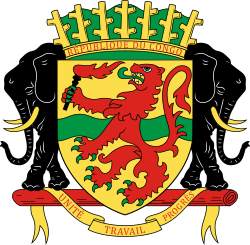| Country | Formal relations began | Notes |
|---|
 Canada Canada | February 1962 | Both countries established diplomatic relations in February 1962 [11] |
 China China | 22 February 1964 | See China-Republic of the Congo relations On February 22, 1964, China established diplomatic relations with the Republic of Congo. [22] |
 Finland Finland | 22 March 1967 | Both countries established diplomatic relations on 22 March 1967 [125] See Finland-Republic of the Congo relations |
 France France | 16 August 1960 | Both countries established diplomatic relations on 16 August 1960 [4] - Republic of the Congo has an embassy in Paris.
- France has an embassy in Brazzaville and a consulate-general in Pointe-Noire. [126]
|
 India India | 26 August 1967 | See Republic of Congo–India relations Both countries established diplomatic relations on 26 August 1967. [42] |
 Israel Israel | 9 November 1960 | Both countries established diplomatic relations on 9 November 1960 when Ram Yaron was appointed first Israel ambassador at Brazzaville. [6] But Congo severance diplomatic relations with Israel on 31 December 1972. [129] Diplomatic relations were restored between them on 14 July 1991. [130] |
 Mexico Mexico | 1990 | Both countries estabblished diplomatic relations in 1990 - Republic of the Congo is accredited to Mexico from its embassy in Washington, D.C., United States. [124]
- Mexico is accredited to the Republic of the Congo from its embassy in Abuja, Nigeria [131]
|
 Namibia Namibia | 23 March 1990 | Both countries established diplomatic relations on 23 March 1990 [84] - Congo has an embassy in Windhoek.
- Namibia has an embassy in Brazzaville.
|
 Poland Poland | 19 December 1972 | Both countries established diplomatic relations on 19 December 1972 [54] See Poland-Republic of the Congo relations |
 Portugal Portugal | 25 May 1961 | Both countries established diplomatic relations on 25 May 1961 when first Ambassador of Portugal with residence in Brazzaville Mr. Gonçalo Correia Caldeira Coelho presented his credentials, but 17 August 1965 Congo severing diplomatic relations with Portugal. Diplomatic ties re-established on 25 January 1975 [57] |
 Russia Russia | 16 March 1964 | Both countries established diplomatic relations on 16 March 1964 [23] The Republic of the Congo has no embassy in Moscow. Russia has an embassy in Brazzaville. |
 Senegal Senegal | 9 April 1969 | Both countries established diplomatic relations on 9 April 1969 when Ambassador of Senegal to Congo (Brazzaville) (resident in Kinshasa) Mr. Mademba Sy presented his credentials to Head of State Major Marien Ngouabi [47] |
 South Korea South Korea | 21 August 1961 | The diplomatic relations between the South Korea and the Republic of the Congo were established on 21 August 1961. [9] Bilateral trade in 2011 totalled $52,940,000 exports, and $78,100,000 imports. The Congo was a major oil exporter to Korea. [132] |
 Tanzania Tanzania | 22 October 1981 | Both countries established diplomatic relations on 22 October 1981 when Ambassador of Tanzania to Congo Mme. Tato Nuru presented his letters of credentials to President of Congo Denis Sassou Nguesso. [74] |
 Togo Togo | 1968 | The two countries maintain diplomatic relations and Togolese President Faure Gnassingbé visited the Republic of the Congo in November 2023 meeting President Denis Sassou Nguesso. [133] |
 Turkey Turkey | 9 November 1981 | Both countries established diplomatic relations on 9 November 1981 [75] - Congo has an embassy in Ankara. [134]
- Turkey has an embassy in Brazzaville. [134]
- Trade volume between the two countries was 57.25 million USD in 2019 (Turkish exports/imports: 1.47/55.8 million USD). [134]
|
 United Kingdom United Kingdom | 1960 | See Foreign relations of the United Kingdom The Congo established diplomatic relations with the United Kingdom on 9 December 1960. - The Republic of the Congo maintains an embassy in London. [135]
- The United Kingdom is not accredited to the Republic of the Congo through an embassy; the UK develops relations through its embassy in Kinshasa, DR Congo. [136]
Both countries share common membership of the Atlantic co-operation pact, [137] the International Criminal Court, and the World Trade Organization. Bilaterally the two countries have an Investment Agreement. [138] |
 United States United States | 15 August 1960 | Both countries established diplomatic relations on 15 August 1960 [3] See Republic of the Congo-United States relations Diplomatic relations between the United States and Congo were broken during the most radical Congolese-Marxist period, 1965–77. The U.S. Embassy reopened in 1977 with the restoration of relations, which remained distant until the end of the socialist era. The late 1980s were marked by a progressive warming of Congolese relations with Western countries, including the United States. Congolese President Denis Sassou-Nguesso made a state visit to Washington in 1990, where he was received by President George H. W. Bush. |
 Zambia Zambia | 12 January 1973 | Both countries established diplomatic relations on 12 January 1973 when the first Zambian Ambassador to the Congo People's Republic (resident in Kinshasa), M. Chalikulima, presented his credentials to President Ngouabi [55] |


